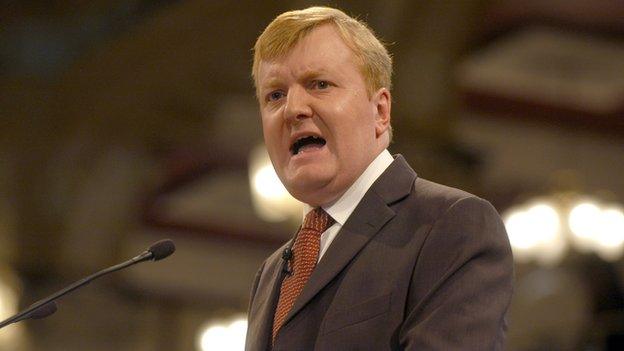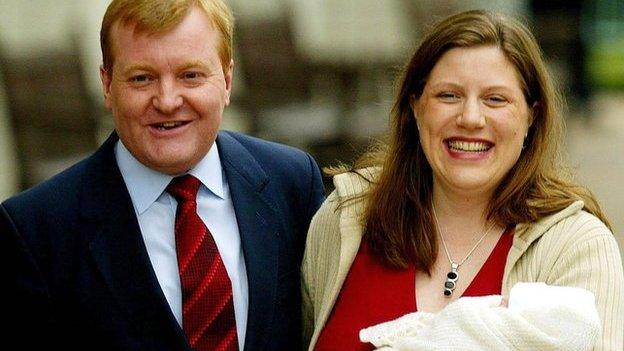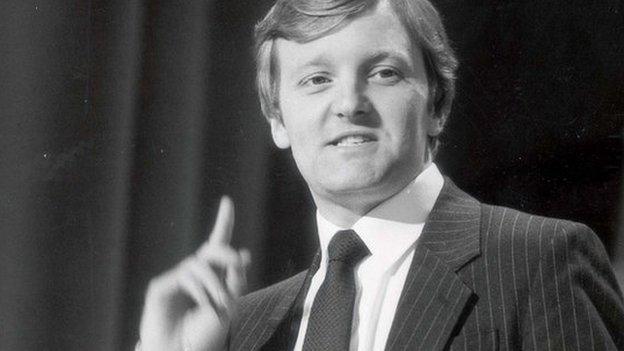Things get real at Holyrood and Westminster
- Published

Scotland faces cuts as a result of George Osborne's savings plan
In the Holyrood chamber, Nicola Sturgeon is facing questions about the impact of her government's spending on health, education and the rest.
The questions are pointed. Indeed, those from Labour's Kezia Dugdale once more resemble a test paper in that she asks the FM, successively, what has happened to the uptake of....
a) modern languages
b) Chinese
c) and Gaelic.
Hint: the figures, according to Ms Dugdale, are not good. Ms Sturgeon stresses the importance attached by her team to the acquisition of language skills.
In her turn, Ruth Davidson for the Conservatives claims that NHS staff are themselves succumbing more and more to illness, driven by work-related stress. Liam Macarthur for the Liberal Democrats detects a comparable problem among teachers.
To each, Ms Sturgeon offers reassurance, taking care to praise the efforts of teachers and health professionals.
So far, so familiar. Legitimate questions, substantive answers. But, at the same time down in Westminster, there are other exchanges which affect the dialogue at Holyrood.
The Chancellor announces further departmental spending cuts of £4.5bn (including the sale of Royal Mail) not for the future but for the current financial year. Scotland's share of those cuts is to be £177m. It is possible for the Scottish government to defer the reductions for one year - although the economies still have to be found eventually.
John Swinney, the Scottish Finance Secretary, is less than pleased - and plans to express the same when he meets George Osborne on Monday for pre-Budget talks. (Today was just a trail: the Budget comes later.)
'Lack of respect'
Mr Swinney deploys the competing mandate argument which I have rehearsed previously on this site. He argues that the people of Scotland demonstrably voted against austerity in the recent election. Yet further austerity, in his view, is being applied in an unwarranted fashion.
He says that the announcement today demonstrates a complete lack of respect for Scotland and the Scottish government, in contrast to the promise delivered by the Prime Minister.
To which the UK government makes three points....
The share of the cuts being borne by Scotland is relatively small - because the NHS and schools are protected. Together, these make up, proportionally, a more significant share of the devolved budget than the UK one.
It is essential to tackle the UK deficit and long-term debt. The quicker this is addressed, the more effective the action.
Holyrood already has tax powers - and will gain more from next April, with more still planned. If MSPs genuinely do not like spending constraint - and genuinely believe Scotland cannot stand it - then they have the option of raising tax. Put up or shut up, as Mr Osborne rather bluntly commented.
Why now? Why cut now rather than wait for the coming Budget in a few weeks time? A range of motivations suggest themselves with, perhaps, two to the fore.
Getting out the bad news about spending now allows Mr Osborne, perhaps, to offer a few goodies to those who voted for the UK government and its policy programme.
Secondly, it is possible that the Chancellor anticipates that it might be even more difficult than previously thought to find the promised £12bn of savings in the welfare budget - particularly as the PM keeps denoting areas which he regards as sacrosanct, such as child benefit.
However, the Treasury insists that today's announcement is not designed to offset decisions on welfare.
- Published2 June 2015

- Published2 June 2015

- Published2 June 2015
